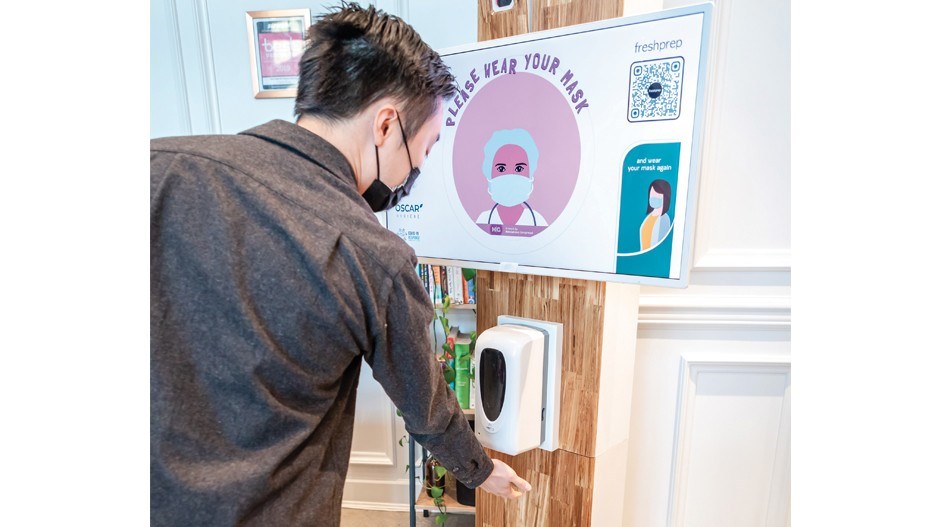About 10,000 deliveries flow out of Fresh Prep Foods Inc.’s production facility on Vancouver’s Victoria Drive each week.
The meal-kit service has seen an uptick in demand amid the pandemic and does not count itself among B.C. businesses with the luxury of sending most employees home to work.
“Being a meal-kit delivery food service that people are really relying and depending on right now means that we need to prioritize the health and safety of our staff to prevent interruptions in our service,” co-CEO Becky Brauer told BIV.
In a bid to mitigate health concerns at the busy workplace, Fresh Prep turned to Vancouver’s Intuitive AI (Intuitive Inc.) for hygiene help.
Anyone entering Fresh Prep’s facility now is greeted by an “Oscar Hygiene” terminal featuring a display with a camera at the top and hand-sanitization unit below.
The display may prompt visitors to sanitize their hands or answer a symptom questionnaire, while a thermal camera confirms their temperature before checking them in and reminding users to put on a face mask.
Brauer recalled that prior to Oscar’s December installation, staff had to check in at a single access point and fill out the necessary paperwork before entering the premises.
“When you have a lot of people checking into a building in a short period of time, you can quickly start to see things like queues forming and lineups, and that’s just not good for your COVID safety plan,” she said.
Intuitive AI got its start deploying scanning devices backed by artificial intelligence in locations such as Vancouver International Airport and Simon Fraser University to visually identify the difference between recycling and trash.
The devices, which feature cameras and large displays attached to garbage and recycling bins, can then direct users to the proper bin in which to place discarded items when they approach.
Intuitive AI’s investors had recognized the potential for the technology backing those devices to influence hygiene behaviour in hospitals as medical professionals walked into different spaces.
“That’s something that they were nudging us towards, and we were already working towards a solution for hand hygiene. And then COVID happened,” Intuitive AI CEO Hassan Murad told BIV.
Work on the R&D project accelerated at the height of the pandemic, and the company partnered with Providence Health Care in Vancouver to begin using Oscar Hygiene in hospitals last spring.
In addition to hospitals, the company is now targeting warehouses and transportation companies. Murad would not disclose the cost of the device, but said the software services that facilitate Oscar Hygiene run for about $1 a day.
Before COVID-19, Traction Guest Inc. CEO Keith Metcalfe said his firm’s contactless screening technology was often considered a “nice-to-have” addition to the office.
But as a result of pandemic, he said, “We’ve started to really find companies coming to us saying, ‘We need to have this.’”
His Burnaby-based startup specializes in visitor management technology for companies like Netflix Inc. (Nasdaq:NFLX).
A Traction Guest survey in December revealed that 38% of employers plan to have 75% in-office capacity by summer 2021. That will increase demand for office health and safety measures.
“How do you manage the complexity of that?” Metcalfe said. “That’s where we come into play, and we don’t think that’s going away. We think the world has somewhat shifted about this whole notion that employers are going to make every employee come in 8 to 5.”
Guests who’ve already been invited to an office via Traction’s platform receive an email with all safety requirements and other details of their visit.
Visitors will need to click on a link that takes them to a registration portal. They can then use their smartphone to scan in on a company iPad without touching any surfaces.
The registration portal, accessed through a web application, takes visitors to a company’s customized website that might do everything from requiring visitors to sign documents to watching a safety video before being permitted to enter.
Meanwhile, Murad said once the pandemic winds down, the Oscar Hygiene devices could be converted into the trash-and-recycling sorting units the company was originally known for.
Technology repurposing has also led to the development of other scanning devices from B.C. companies.
Vancouver’s Tevano Systems Inc. was previously best known for specializing in contactless payment systems.
Last November, it began deploying its Health Shield devices for people visiting sites such as food-distribution plants or transportation hubs.
The scanning devices, which cost less than $2,000 per unit, use thermal imaging for temperature checks and AI-powered facial recognition to determine if users are wearing face masks.
A display screen can prompt users with further instructions based on the results of the scans.
“We realized that we had the essential tool sets as a platform in place. So by adopting this technology and coding so that we can then plug into that [Health Shield device], we were able to really accelerate our ability to get this product to market,” CEO David Bajwa said.
Even after the pandemic ends, he said health concerns will persist around the spread of other diseases, so Tevano is also targeting assisted-living facilities with the devices.
Bajwa also believes that the presence of these types of scanning devices can act as a deterrent to people who may wish to enter buildings even if they know they’re feeling ill, likening it to people who would leave weapons at home knowing they have to go through a metal detector at an airport.
“We’re going to see a lot more adoption of technologies that are going to be able to allow everybody to get back to … as normal as they can [be],” he said. •




